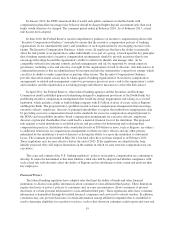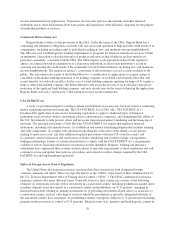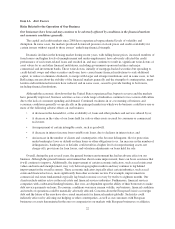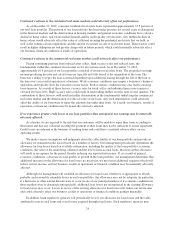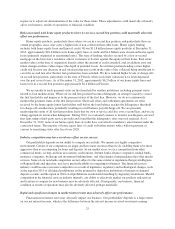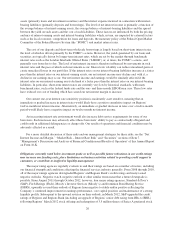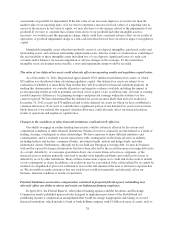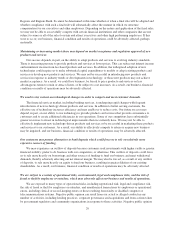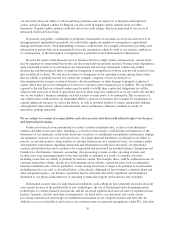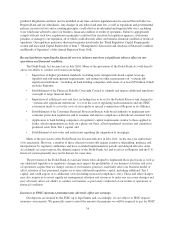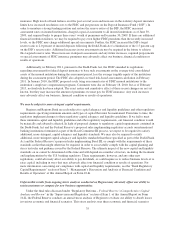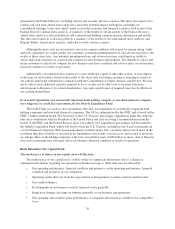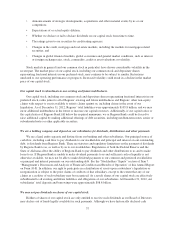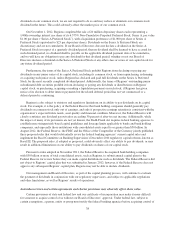Regions Bank 2012 Annual Report Download - page 45
Download and view the complete annual report
Please find page 45 of the 2012 Regions Bank annual report below. You can navigate through the pages in the report by either clicking on the pages listed below, or by using the keyword search tool below to find specific information within the annual report.Regions and Regions Bank. It cannot be determined at this time whether or when a final rule will be adopted and
whether compliance with such a final rule will substantially affect the manner in which we structure
compensation for our executives and other employees. Depending on the nature and application of the final rules,
we may not be able to successfully compete with certain financial institutions and other companies that are not
subject to some or all of the rules to retain and attract executives and other high performing employees. If this
were to occur, our business, financial condition and results of operations could be adversely affected, perhaps
materially.
Maintaining or increasing market share may depend on market acceptance and regulatory approval of new
products and services.
Our success depends, in part, on the ability to adapt products and services to evolving industry standards.
There is increasing pressure to provide products and services at lower prices. This can reduce net interest income
and noninterest income from fee-based products and services. In addition, the widespread adoption of new
technologies could require us to make substantial capital expenditures to modify or adapt existing products and
services or develop new products and services. We may not be successful in introducing new products and
services in response to industry trends or developments in technology, or those new products may not achieve
market acceptance. As a result, we could lose business, be forced to price products and services on less
advantageous terms to retain or attract clients, or be subject to cost increases. As a result, our business, financial
condition or results of operations may be adversely affected.
We need to stay current on technological changes in order to compete and meet customer demands.
The financial services market, including banking services, is undergoing rapid changes with frequent
introductions of new technology-driven products and services. In addition to better serving customers, the
effective use of technology increases efficiency and may enable us to reduce costs. Our future success may
depend, in part, on our ability to use technology to provide products and services that provide convenience to
customers and to create additional efficiencies in our operations. Some of our competitors have substantially
greater resources to invest in technological improvements than we currently have. We may not be able to
effectively implement new technology-driven products and services or be successful in marketing these products
and services to our customers. As a result, our ability to effectively compete to retain or acquire new business
may be impaired, and our business, financial condition or results of operations, may be adversely affected.
Our customers may pursue alternatives to bank deposits which could force us to rely on relatively more
expensive sources of funding.
We may experience an outflow of deposits because customers seek investments with higher yields or greater
financial stability; prefer to do business with our competitors, or otherwise. This outflow of deposits could force
us to rely more heavily on borrowings and other sources of funding to fund our business and meet withdrawal
demands, thereby adversely affecting our net interest margin. We may also be forced, as a result of any outflow
of deposits, to rely more heavily on equity to fund our business, resulting in greater dilution of our existing
shareholders. As a result, our business, financial condition or results of operations may be adversely affected.
We are subject to a variety of operational risks, environmental, legal and compliance risks, and the risk of
fraud or theft by employees or outsiders, which may adversely affect our business and results of operations.
We are exposed to many types of operational risks, including reputational risk, legal and compliance risk,
the risk of fraud or theft by employees or outsiders, and unauthorized transactions by employees or operational
errors, including clerical or record-keeping errors or those resulting from faulty or disabled computer or
telecommunications systems. Negative public opinion can result from our actual or alleged conduct in any
number of activities, including lending practices, corporate governance and acquisitions and from actions taken
by government regulators and community organizations in response to those activities. Negative public opinion
29


